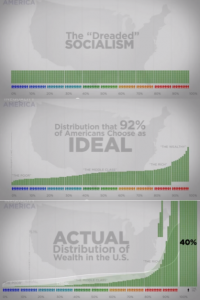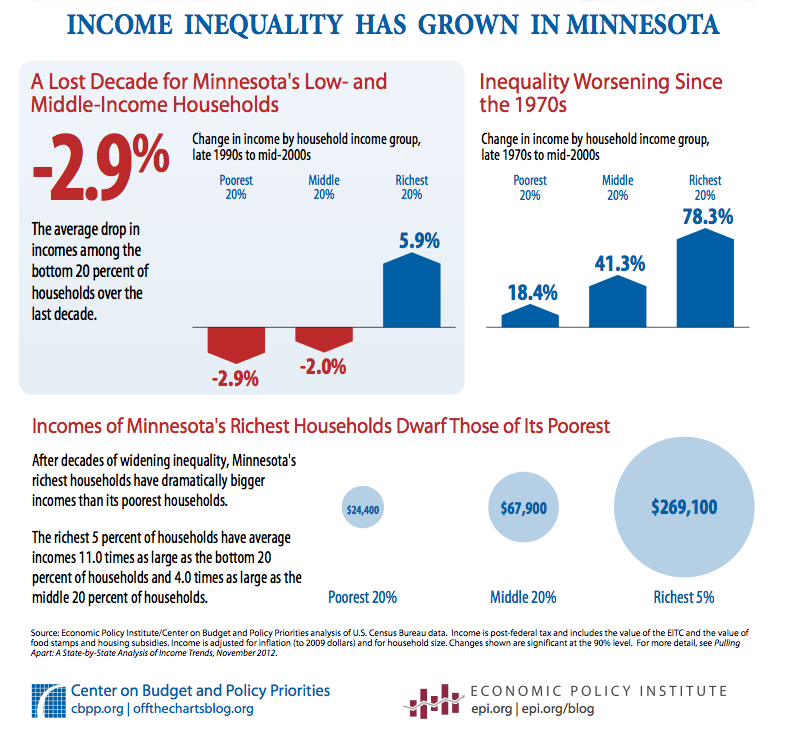Taxing millionaires. Surcharging millionaires. Raising the minimum wage.
For the casual observer who hasn’t done their homework, I can see how this might be confused with “class warfare” waged by mean DFLers intent on punishing rich people.
But here’s the thing about warfare. You can’t take a quick glance at a battlefield and identify the aggressors. For instance, an observer flying over Normandy Beach on June 6, 1944 couldn’t reasonably conclude “those mean Americans storming that beach down there are obviously wreckless war mongers.”
After all, what about the blitzkreig and Pearl Harbor, right? You have to know at least a bit about the prelude to an event to be able to make informed conclusions about the event.
So it goes with the “class warfare” charges flying around the 2013 Minnesota Legislature. Observers who say the DFL has launched an all-out “class war” against wealthy Minnesotans need to look at the prelude to the policy.
Context
As the following chart shows, in recent years the wealthiest Minnesotans have been doing very well, thank you very much. At the same time, poor and middle-income Minnesotans have been doing relatively poorly.
“The rich are getting richer, and the poor are getting poorer” isn’t just a cheap slogan. In Minnesota right now, it’s the demonstrable truth.
As billionaire Warren Buffet put it:
“There’s class warfare, all right, but it’s my class, the rich class, that’s making war, and we’re winning.”
That little piece of historical context explains why wealthy Minnesotans are being asked by DFL legislators to do the most to address Minnesota’s structural deficit problem. Wealthy people are being asked to pay more, because they have by far the most capacity to do more. This terrific infographic video explains the breathtaking degree of concentration of wealth in America:
This is important context for understanding the DFL proposals to increase taxes on the rich and raise the minimum wage, just as the blitzkrieg is important context for understanding the storming of Normandy.
Perspective
Along with reporting the context, we also have to keep the proper perspective about what the DFL’s proposals would, and would not, do.
Despite the hyperventilation on the right, nobody is proposing communist-style income equality. Not even close. The DFL legislators are talking about a very modest adjustment for the wealthiest Minnesotans, an adjustment that will still leave them, far-and-away, the wealthiest Minnesotans.
To summarize, if there is a class war going on, poor- and middle-income families didn’t start it. But I reject the assertion that there is a “war” of any type going on. What the DFL proposes is a modest adjustment to a system that has gotten badly out-of-whack.
That’s not war. That’s wisdom.
– Loveland
Note: This post was also featured in Politics in Minnesota’s Best of the Blogs.


Good article, as far as it goes. It makes a nice start to a much fuller conversation. After observing the change in income inequality, it would make sense for a journalist to try to add context about what is driving the inequality (are people cheating and stealing to get rich, are they working harder, making different choices, delaying gratification, exercising better judgment?) and also provide context about income/economic mobility (did the individuals that were poor and rich in the ’70 stay in the same place or did individuals move up and down the economic spectrum?). Looking at groups over time and assuming that the group membership stays the same distorts the picture. More relevant context is needed to make value judgments about the observations. One dimensional journalism neither properly serves the subject nor the reader.
Fair enough. One part of the answer is that we don’t have a very progressive tax system any more, as discussed in this earlier post.
Incidentally, some people off-line have been asking why not focus on wealth instead of income, since the very wealthy sometimes have relatively little earned income.
I don’t disagree. For this reason, I’m also for higher estate taxes and capital gains taxes.